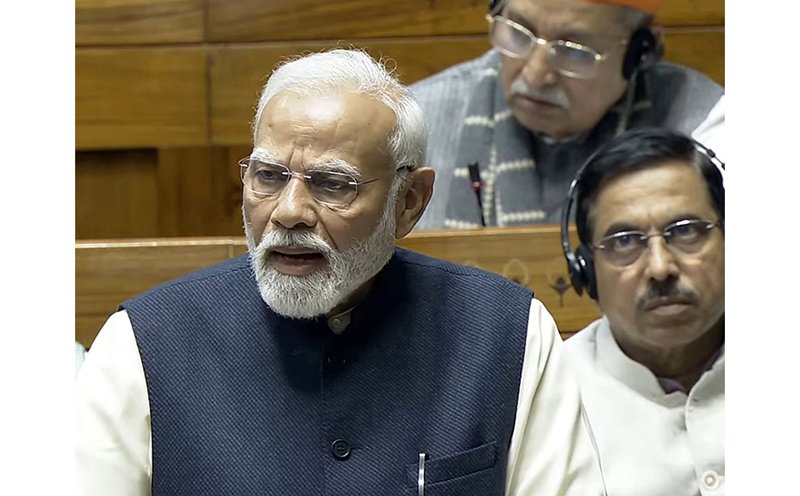‘370 was an obstacle to national unity, we have removed it’
*We have reinforced the Constitution, while Congress has continuously undermined it
Sanjeev Pargal
JAMMU, Dec 14: Prime Minister Narendra Modi stated today that Article 370 of the Indian Constitution, which provided special status to Jammu and Kashmir, became a barrier to national unity, leading to its removal. He also mentioned Article 35 A, indicating that Parliament was kept uninformed regarding this provision.
Join the Daily Excelsior channel on WhatsApp
In response to a two-day debate in Lok Sabha on the ‘Glorious Journey of 75 Years of the Constitution of India’, Modi accused Congress of causing issues in Jammu and Kashmir, asserting that the Parliament was bypassed when Article 35 A was passed.
“While many are aware of Article 370, few know about Article 35-A. The Parliament, being the first authority of the Indian Constitution, was stifled by them,” the Prime Minister remarked, suggesting that Congress has persistently disrespected the Constitution.
“Had Article 35-A not been enacted, the current situation would not have arisen. The lawmakers were kept in the dark due to hidden agendas. They concealed things from the citizens,” he stated.
Stressing that Article 370 posed an obstacle to the country’s unity, Modi emphasized that fostering unity is a fundamental principle of our Constitution, and that is why we have eliminated Article 370.
“Reviewing our policies over the last decade, it’s evident that the public has entrusted me with the responsibility to serve. If you analyze those decisions, you will see consistent efforts to enhance India’s unity,” he added.
On August 5, 2019, the Central Government led by Narendra Modi nullified Articles 370 and 35-A, stripping the formerly special status of Jammu and Kashmir and splitting it into two Union Territories: J&K and Ladakh.
The Prime Minister has consistently asserted that BR Ambedkar’s Constitution was completely implemented in Jammu and Kashmir under his governance.
PTI adds: On Saturday, Prime Minister Modi claimed that the Congress party, having “tasted blood,” has often violated the Constitution, while his Government’s policies since 2014 have aimed to enhance India’s strength and unity in accordance with the Constitutional vision.
During a debate in Lok Sabha commemorating 75 years since the Constitution’s adoption, he criticized the previous Congress governments for sowing “toxic” seeds in the nation’s diversity, exacerbating its contradictions and undermining its unity.
Targeting the Nehru-Gandhi family, he claimed they have consistently undermined the Constitution.
“This family has challenged the Constitution at every level,” he said, adding he was specifically addressing them since their members held power for 55 years.
The family has repeatedly injured the Constitution, he noted, referencing numerous decisions made by Jawaharlal Nehru, Indira Gandhi, and Rajiv Gandhi during their tenure as Prime Ministers.
He also hinted at the current generation’s participation in similar actions, referring to Leader of Opposition Rahul Gandhi and his sister Priyanka Gandhi Vadra.
Modi declared that leaders like him, and many others from humble backgrounds, owe their achievements to the strength of the Constitution, emphasizing his unwavering commitment to its principles.
As the Chief Minister of Gujarat, he recalled how his government celebrated the Constitution’s 60th anniversary by placing a copy of it on an elephant while walking underneath barefoot, symbolizing its supremacy.
Critiquing the Nehru-Gandhi family further, he noted that Jawaharlal Nehru amended the Constitution to restrict freedom of expression and that his daughter, Indira Gandhi, declared a state of Emergency to defy a Supreme Court ruling that annulled her election as an MP.
She “stifled democracy in India and maimed the Constitution” as the 25th anniversary of its adoption approached, he said, adding that she also modified the Constitution to shield the president, vice president, and herself from legal challenges retroactively.
The country was essentially imprisoned and the judiciary suppressed, he remarked. Rajiv Gandhi, who succeeded his mother as Prime Minister, also made amendments to the Constitution.
This tarnish on the Congress cannot be erased, Modi contended.
Without directly naming Rahul Gandhi, the Prime Minister pointed out that an “arrogant” individual tore up a Cabinet decision while the Congress-led UPA was in power under then Prime Minister Manmohan Singh.
He added that the National Advisory Council, chaired by Sonia Gandhi, was placed “above” the Cabinet during UPA’s governance.
Modi highlighted that the Constitution’s creators deliberately chose to disallow reservations based on religion to maintain national unity. In contrast, out of “greed for power,” the Congress sought to violate this principle for electoral gain.
Modi put forth 11 resolutions, which include maintaining existing reservations for marginalized groups but resisting any religion-based quotas.
He asserted that the Constituent Assembly had thoroughly deliberated against religion-based reservations, accusing the Congress of now promising such policies for electoral appeasement.
The resolutions proposed by Modi at the conclusion of his extensive 110-minute address also included calls to end dynastic politics, prioritize merit over nepotism in governance, and affirm zero tolerance for corruption.
The Prime Minister stated that these resolutions are geared towards shaping the future of India.


Leave a Reply